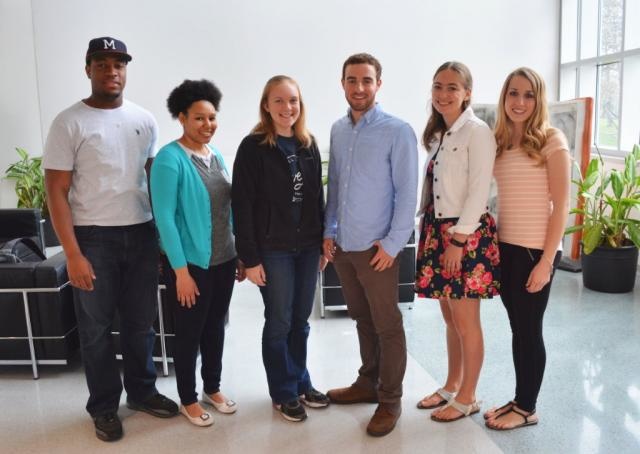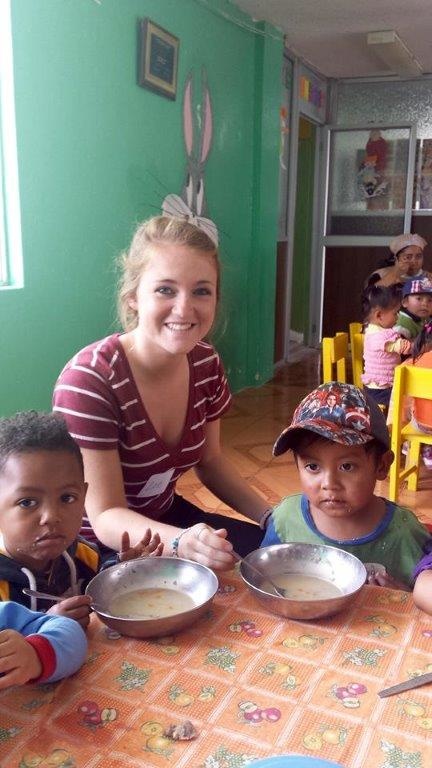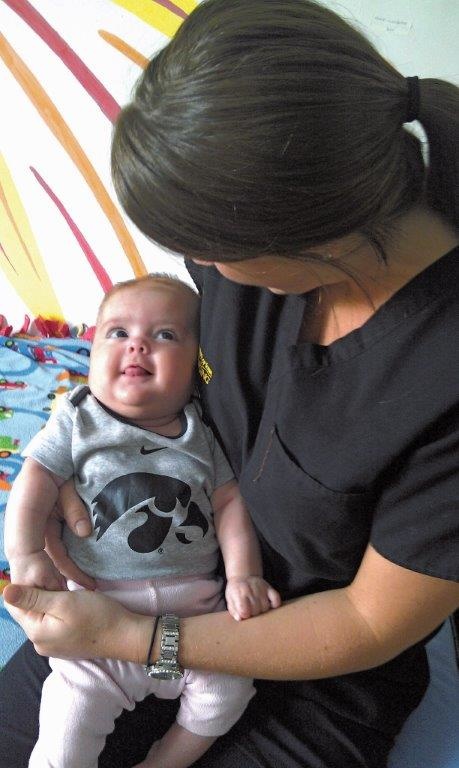
The winners of the 2016 Dr. Ken Magid Child Advocacy Service Scholarship. From left to right: Micah Augusma, Amira Nash, Alyssa McIntyre, Ben Hyland, Alyssa Peiffer, and Margaret Timm, Photo courtesy of the UI Alumni Association.
By Mikael Mulugeta, Iowa Now
As diplomatic relations between the United States and Cuba continue to improve, so does access to the country for United States citizens—including two University of Iowa students.
On June 18, Amira Nash and Benjamin Hyland will travel to Cuba for a two-week service trip as part of the Dr. Ken Magid Child Advocacy Service Scholarship program's annual service trip experience.
"Our trip to Cuba comes at a pivotal time in Cuban-American relations," says Hyland, a second- year economics and international relations major from Vinton, Iowa. "I am truly grateful for the opportunity to travel to a country that has been off-limits to American travelers for so long."
The U.S. has gradually eased travel and trade restrictions on Cuba over the past decade, including three amendments to these restrictions since January 2015.
The Magid scholarship was founded in 2005 by UI alumna Linda Baker after she traveled to Romania as part of the UI Alumni Association's first service-oriented trip. While there, she volunteered at an orphanage, which inspired her to create a scholarship to enable UI students to engage in similar experiences. The scholarship is named for her former mentor, author and child behaviorist Dr. Kenneth Magid.
In its first year, the scholarship could only fund service trips for only two students, and Romania was its only destination. Eleven years later, the Magid scholarship funds trips for six students and has added additional destinations—Ecuador in 2013 and Cuba in 2016. Plans are in the works to add a location in the continental U.S.
The scholarship covers round-trip airfare from Chicago, hotel accommodations, program materials, on-site training, and most meals.
Once in Cuba, Hyland and Nash will travel to Ciego de Ávila to teach conversational English to secondary students and work in a community garden that provides produce to a local food bank.

Zoe Feldmann smiles with children in an Ecuadorian daycare during the 2015 service trip. Photo courtesy of the UI Alumni Association.
"They will also be doing other repair and construction projects with community centers and schools," says Diane Baker, director of Alumni Travel. "The intent is still child advocacy, although it's not taking the form of direct child care."
Baker says the service trips can help students gain experience applicable to their fields, build confidence, and help determine if their chosen major is a good fit.
"The program provides a unique combination of many of my interests, including community development, international study, and experiential service," says Hyland.
President Barack Obama's March 2016 visit to Cuba marked the first by a sitting president in 85 years. About 150,000 U.S. citizens traveled to Cuba in 2015, up from 91,000 in 2014, according to the U.S. Council on Foreign Relations.
The program also alleviates the financial burden for students who want to travel and broaden their cultural horizons.
"What you read in a book about a country does not paint a complete picture of that nation and its people," says Nash, a third-year psychology and secondary education major from North Liberty, Iowa.
Baker says it is common for returning students to express a desire to go on more volunteer trips.
"This experience can open up a whole world of possibility to them," says Baker. "Some say they couldn't imagine traveling in the future simply as tourists. They would have to be doing volunteer work of some kind."
Service trips to Ecuador and Romania center on providing direct care to children by playing and socializing with them, feeding them, and providing other related services.
In Romania, UI students volunteer in a hospital where the children range in age from infants to 10-year-olds. Many of the children in this facility have developmental or physical disabilities, and the UI students who participate tend to have health care-related majors, including nursing, physical therapy, and child health.

Shannon Becker holds an infant in a Romanian hospital during the 2012 service trip. Photo courtesy of the UI Alumni Association.
In Ecuador, UI students work at a conventional daycare where most of the children come from impoverished families; the daycare services allow their parents to go to work. UI students who choose Ecuador as a destination tend to major in social work and elementary education.
In 2011, UI alumna Caroline Halfwassen made twenty quilts for UI students to give to children in Romania and, later, Ecuador. The quilts are decorated with farm animals, natural landscapes, and medieval castles. Each is embroidered with the words, "From someone who cares in the U.S.A."
Micah Augusma, a student from this year's Ecuador trip, says some of the tasks he performed included helping children learn English, sanding and repainting tables, and renovating high chairs for toddlers.
"This trip was absolutely surreal; it was very humbling," says Augusma, a first-year medical anthropology major from Grimes, Iowa. "I saw that people interpret being poor and rich in different ways. People find ways to be happy with what they have, and it's the little, simple things in life that matter."
The Dr. Ken Magid Child Advocacy Service Scholarship is funded by the UI Alumni Association, and the UI is the only school in the Big Ten Conference to administer service trips through its alumni association.
In 2017, the service trips will open up to alumni as paying travelers who will volunteer at the same destinations.
"We're looking forward to alumni working alongside current students in future trips," says Baker. "It will be a great bonding opportunity for the alumni and current students to learn from each other."